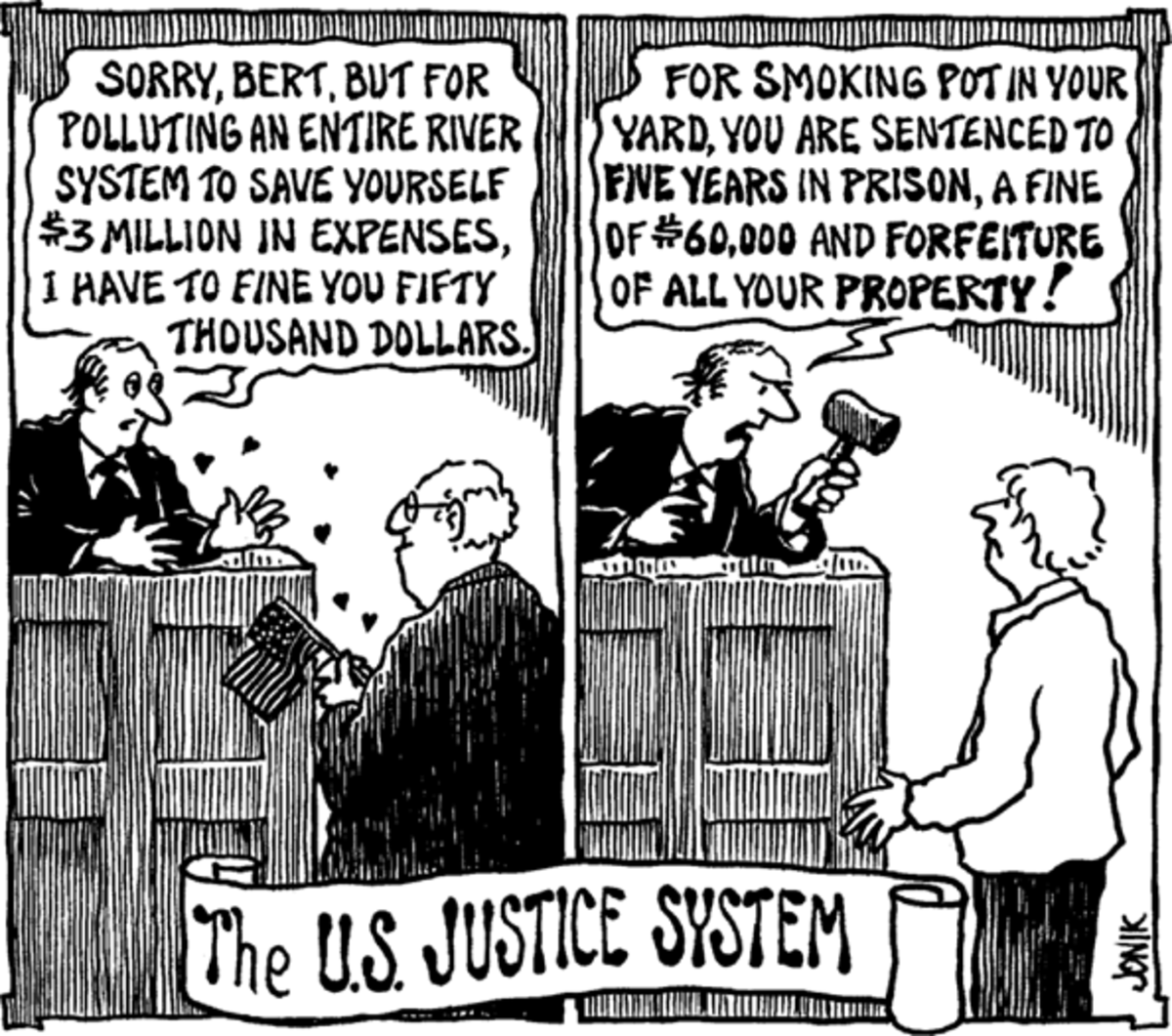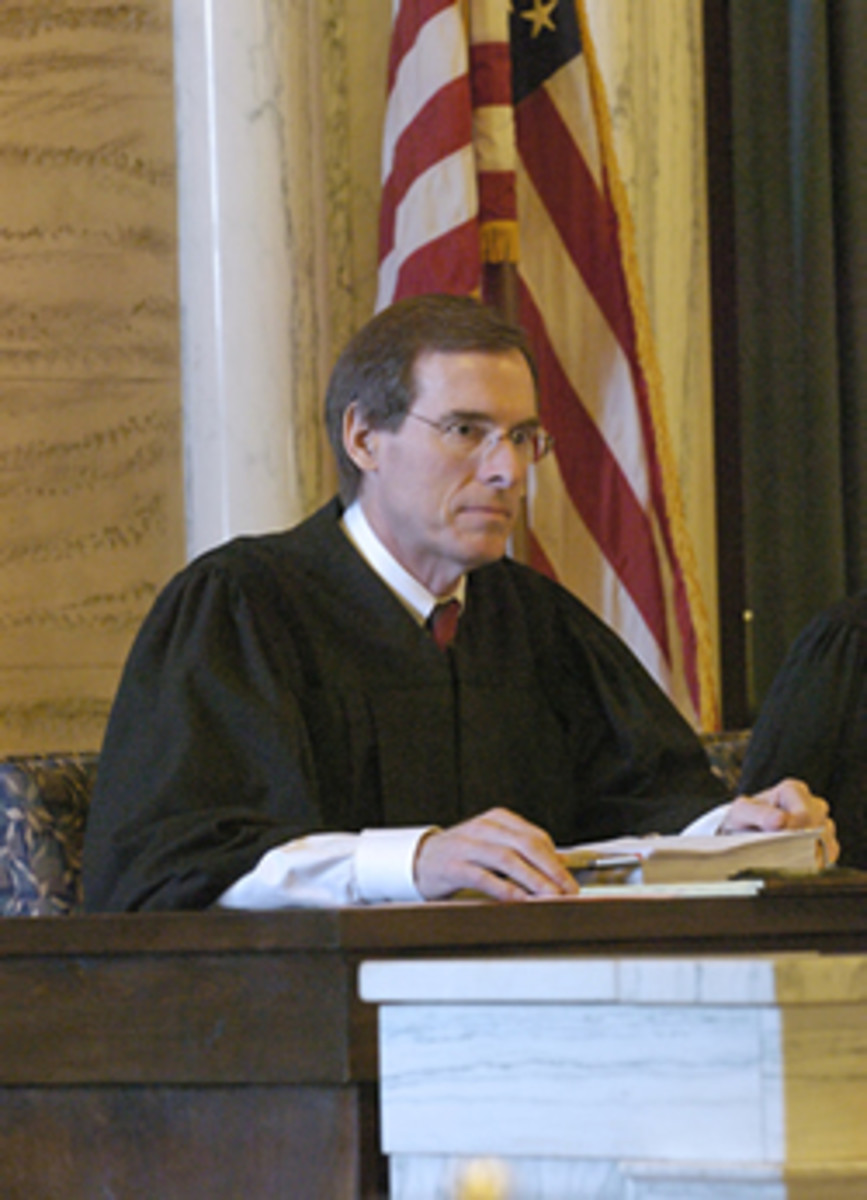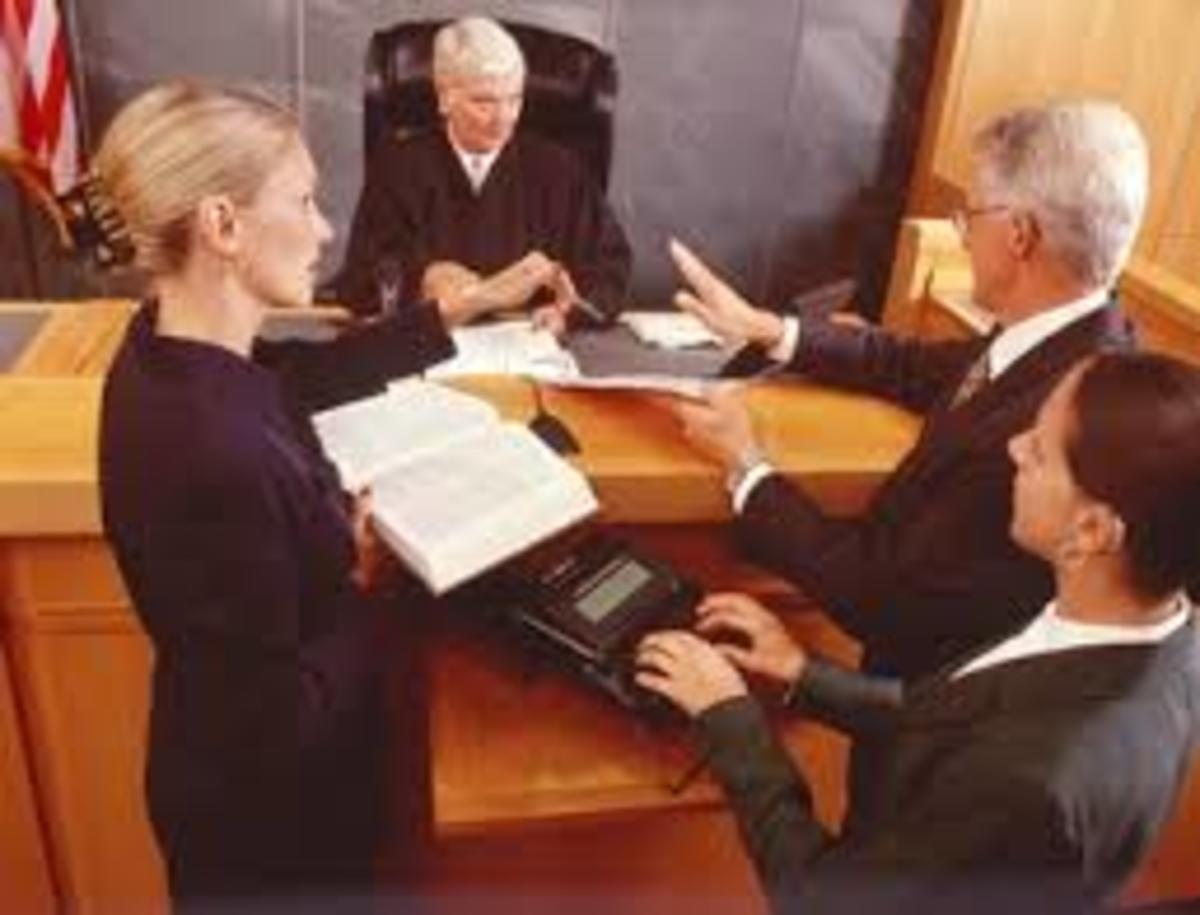Criminal Justice Glossary of Terms

By Joan Whetzel
According to the American Heritage Dictionary Criminal Justice is “the system of law enforcement, corrections, and probation ... involved in the apprehention, presecution, defense, sentecing, incarceration, and supervision of those suspected, charged with” or convicted of criminal offenses.” There are a number of terms that help explain what’s going on in criminal cases.
A
A/O: Arresting Officer
Abduction: To take a person without his or her consent.
Abet: The act of inciting someone to commit a crime.
Absentia: Court proceedings that occur without the presence of the defendant.
Absolve: The release a person from penalties or obligations from a criminal act.
Accessory: A person indirectly involved in a crime, but who assists the offender of the crime.
Accomplice: A partner in crime; a person who voluntarily paticipates in the criminal activity of another person.
Acquaintance Rape: Sexual assault by someone known to the victim.
Acquittal: Court judgement that the defendant is not guilty of the crime for which he or she was tried.
Ad Litem (Latin): Meaning “for the purpose of the lawsuit.” A guardian ad litem is a lawyer or person assigned by the court to protect the interests of a minor or any person not competant to represent themselves in court.
Adjudication: Court judgement rendered after a determination of legal or factual issues.
Admissibility: Statement or evidence allowed to be used in crimal court against a defendant.
Admissible Evidence: Evidence that is legally allowed in a civil or criminal court of law.
Admission: Acknowledgement of criminal behavior or involvement.
Admonish: Advising caution in court for wrong practices.
Affidavit: Statement signed under oath that the contents of the statement are true to the best of his or her knowledge; signed by a notary; may be accepted by a judge in the place of witness testimony.
Affirmative Defense: Raising the circumstances of self-defense, insanity, or entrapment as an excuese to negate criminal responsibility for having committed a crime.
Aggravated: Any offense (aggravated robber, aggrivated assault) made more serious by the use of a deadly weapon when the offense was committed.
Aid and Abet: Actively, knowingly or intentionally assisting another person in the commission of a crime.
a.k.a: Means "also known as"; used for aliases.
Allegation: Written document or pleading about what a person is prepared to prove in court; accusations of crimes against the defendant.
Allocution: Individual’s right to offer a written or oral statement before a court.
Ambush: Surprise attack by one or more people against an unsuspecting victim.
Appeal: Legal process asking a superior court to review a decision by an inferior court.
Appellate Court: A superior court that has jurisdiction to review decisions by a lower court.
Arrest: Taking a person into custody, under the authority of the law, to charge him or her with a criminal offense.
Arson: Damaging real or personal property on purpose with the use of fire.
Assault: Intentionally threatening violence(with words or actions) toward another person, combined with the ability to carry out the threat.
Assault and Battery: Placing another person in reasonable fear of an attack by making threats of imminent physical harm.
Attorney-Client Privilege: The understanding between an attorney and client that all communications will remain private.
B
Bad Faith: The intent to deceive another person.
Bail: The payment of cash as surety for the release of a defendant, to insure that the defendant will appear in future court actions.
Bail Bond: The obligation to pay the bail made by the person signing for the release of the accused.
Battery: Intentionally touching or striking another person against their will.
Bench Trial: Trial by judge rather than by jury.
Bench Warrant: Order by a judge for an arrest of a person who failed to appear for a court ordered appearance.
Beyond a Reasonable Doubt: Criminal case standard requiring the jury to arrive at a verdict of guilt when satisfied by a moral certainty that the elements of the crime have proven by the prosecution.
Bind Over: The act by a judge requiring a person to furnish bail or recognize that they must appear for trial.
Booking: The process of taking photos, fingerprings, and recording identifying information about a criminal suspect.
Burden of Proof: Rule of evidence requiring the prosecution to prove their case of the defendant’s guilt.
Burglary: Entering a building illegally, to commit felony theft.
C
Capias: A judge’s order for the arrest of an individual.
Capital Crime: A crime that is punishable by the death penalty.
Capital Punishment: The death penalty.
Chambers: The judges office; hearing in the judge’s office.
Change of Venue: Moving a lawsuit or trial to another judge’s court for trial.
Charge to the Jury: The judge’s instructions to the jury.
Circumstantial Evidence: Evididence that may help the judge or jury whether the facts of the case have been proven.
Collusion: Secret agreement between 2 or more people with conflicting interests, where they agreed to abuse the law, deceive the court, or to defraud a third party.
Concurrent Sentences: Sentencing for the convicition of 2 or more crimes, where the sentences are served at the same time.
Consecutive Sentences: Sentences for criminal convictions that are to be served back to back, or one after the other.
Contempt of Court: An act of defiance against the authority of the court.
Continuance: A request by a lawyer, and acceptance by the judge, to dlaty a trial to a later date.
Conviction: Judgment by a judge or jury that the defendant is found guilty.
Corroborating Evidence: Any evidence that strengthens other evidence or proof.
Court-Appointed Attorney: Lawyer appointed by the court to represent a defendant who cannot afford one.
Criminal Action: Lawsuit in which the state or public is the plaintiff bringingaction against the defendant accused of a crime.
Cross Examination: Questioning a witness by the lawyer from the other side.
D
Defendant: The person accused of the crime.
Deposition: A witness’s official statement taken in writing b the opposing attorney.
Direct Evidence: Evidence that directly links the accused to the crime.
Direct Examination: Questioning of a witness by the party’s lawyer.
Directed Verdict: Order from a judge for the jury to return a specific verdict.
Discovery: Pre-trial litigation process where each party requests relevent information or documents from the other side so that they can discove pertinent facts to prove their case, or disprove the other side’s case.
Dismissal with Prejudice: Dismissal of a case where the prosecution cannot bring another case against the defendant on the same claim.
Dismissal without Prejudice: Dismissal of a case which allows the prosecution to file a new case on the same claim.
Double Jeopardy: Putting a person on trial 2 or more times for the same crime.
Due Process: Fundamental prorcedural legal safeguard in which every US citizen has a right to their day in court in cases that affect their rights as a citizen.
Duty to Warn: Obligation (by lawyers, teachers, psychiatrists, doctors, police, etc.) to warn people of danger.
E
Embezzle: Illegal transfer of money or property to divert to the embezzler by fraudulant action.
Entrapment: Inducement, by law enforcement, of another person to comit a crime for the purpose of bringing charges against them.
Estop: impeding or prohibiting an action by estoppel.
Estoppel: Rule of law when one person (a) uses words or actions to cause another person (b) to believe certain facts upon which they will take action. Person (A) can’t claim later that his earlier acts or word were improper.
Evidence: Proof of facts presented in court.
Exculpate: (exculpatory evidence) Something excuses (justifies) a wrong action.
Exigent Circumstances: Emergency conditions.
Ex Parte Proceeding: Legal procedure where only one side is represented.
Ex Post Facto (Latin): “After the fact.” Laws that permit conviction and punishment for a lawful act performed before the law was changed and the act made illegal.
Exonerate: Eliminatng a charge, responsibility or duty.
Expunge: Physically erase, white out, or strike out something from a court record; removing every reference to it from the court file.
Extortion: Forcing payment by force or threat.
F
False Arrest: Arrest without sufficient evidence or cause.
False Confession: A confession given by someone who did not commit the crime.
False Impersonation: Claiming to be someone else.
False Pretenses: A person falsely representing himself to gain money, services or items.
Felony: A serious crime for which the punishment is prison for more than a year or death.
Finding: Formal conclusion by a judge or regulatory agency
Forcible Felony: Treason and any felony involving the use or threat of physical force or violence against a person.
Frame-up: An attempt to point a crime to or setting up another person as the responsible party.
Fraud: Intentionally deceiving another person to deprive them of property or to injure that person in some way.
G
Grand Jury: A jury of inquiry (15 to18 persons) with at least 12 concurring before and indictment may be returned.
Gross Negligence: Action or an omission in reckless disregard of the consequences to the safety or property of another.
Guardian Ad Litem (Latin): "Guardian at law." A guardian/lawyer appointed to represent an infant, child or someone mentally incapable defendant
H
Habeas Corpus (Latin): "You have the body." A writ used to bring a person before the court to determine whether he/she is being detained unlawfully.
Hearsay: Statements by a witness who did not see or hear the incident in question but heard about it from someone else.
Homicide: The unlawful killing of a human being.
Homicide, Justifiable: Homicide based on the perpetrator's reasonable belief that he had no alternative but to use deadly or substantial force to protect himself from immanent death.
Hostile Witness: A witness whose testimony is not favorable to the party who calls him/her as a witness.
Hung Jury: Jury that is unable to reach a verdict.
I
Immunity: Grant by the court assuring someone won’t face prosecution in return for providing criminal evidence.
Impairment: A person’s faculties are diminished so that his/her ability to sea, hear, talk, walk, or judge distances falls below norma.
Impeachment of a Witness: Attack on witness’s credibility.
Inadmissible: Under the rules of evidence, something that cannot be admitted into evidence.
Incapacity: Lack of legal ability to act; disability; incompetence.
Incompetent: a person lacking the ability, legal qualification, or fitness to manage his or her own affairs.
Indictment: A document issued by a grand jury to the court, fromally charging the named person with committing a specific offense.
Infringement: Unauthorized use.
Instruction: a judge's explanation to the jury before it begins deliberations of the questions it must answer and the applicable law governing the case.
Intentional Tort: Wrong perpetrated by a person who intends to break the law.
Interlocutory Order: Temporary order issued during the course of litigation, which cannot be appealed because it is not final.
Intimate Violence: Violence between people that are living together, and who may or may not be related.
Intimidation: Threatening another person in order to influence his behavior. The threat may include physical harm, restraint, confinement or accusations of crime (even if true).
J
Judgment: A court decision establishing the rights of the parties in an action or proceeding.
Judicial Notice: Act by which a court recognizes the existence of a certain fact without the production of substantiating evidence.
Judicial Review: The authority of a court to review the official actions of other branches of government.
Jurisdiction: The power to hear and determine a case. A court's authority to rule on the questions of law at issue in a dispute, typically determined by the geographic location and the type of case.
Jury Polled: Asking each juror to affirm his or her verdict in open court at the conclusion of a trial.
Jury Charge: The judge's instructions to the jurors on the law applying to the case they will be deciding.
Just Cause: A legitimate reason.
K
Knowingly and Willfully: Consciously and intentionally.
L
Larceny: Obtaining property through deceit.
Lesser included offense: Any lesser offense included with the original charge.
Liable: Legally responsible.
Libel: Published words or pictures maliciously defame a person
Limine: Motion requesting that certain evidence not be allowed because it might prejudice the jury.
Lockup: Temporary detention facility
M
Malfeasance: Evil doing, bad conduct; the commission an act which prohibited by law.
Malicious Prosecution: Prosecution without probable cause, instituted with inten injure the defendant.
Mandamus: A court ordered writ ordering a public official to perform an specific act.
Mandate: Official decree issued by a court of appeal.
Mandatory Sentence: Criminal sentence, established by a legislature, setting up the minimum length of a prison sentence for specified crimes.
Manslaughter: Unlawful, but unintentional, killing another person.
Marital Rape: Forced sexual intercourse on a spouse.
Mens Rea: The necessary criminal intent to establish criminal responsibility.
Mistrial: A trial declared invalid due to fundamental error
Mitigating Circumstances: Factors which do not justify or excuse an offense but which may be considered reasons for reducing the amount of blame.
M.O.: "Modus Operandi" meaning "method of operation."
Moot: A case or point not subject to a judicial decisin because it involves an abstract question that has already passed.
Motion: A written request to the Court asking that a specific action be taken.
Motion for a New Trial: Request by a losing party asserting that a trial was unfair because of legal errors that prejudiced its case.
Motion to Dismiss: A defendant’s request to a judge asserting that the prosecutor is not
entitled to any legal relief and thus the case should be dismissed.
Motion to Suppress Evidence: A request to keep out evidence at a trial or hearing because the evidence was unlawfully obtained.
N
Negligence: Failure to exercise the degree of care that a reasonable person would exercise under the same circumstances
No True Bill: A grand jury states that the evidence on the written indictment submitted to it for its approval found insufficient to indict.
No Probable Cause: Insufficient grounds for arrest
Nolle Prosequi: Charges dismissed by the prosecutor.
Nolo Contendere: The case is closed because the person does not contest charges.
Notice of Appeal: The document filed with the trial court in order to pursue an appeal.
O
Objection: The process when one party takes exception to statements or procedure.
Own Recognizance: The person charged with an offense promises to appear in court to answer criminal charges in exchange for being released from jail while awaiting trial.
P
Parole: conditional release of a prisoner before the sentence was completed, supervised by a parole officer, and set with conditions for maintaining the freedom from jail.
Penalty Phase: The part of the trial when the jury decides the penalty or damages to be imposed.
Peremptory Challenge: The elimination of a potential juror for no cause.
Petition: Request for the court to take action
Plea: Defendant's answer to the charges against him/her - guilty, not guilty or nolo contendere.
Plea Bargain: The process in which the defendant and prosecution negotiate a mutually satisfactory outcome for the case.
Postponement: Ddelay in court proceedings.
Precedent: A previously decided case that helps decide future cases.
Preliminary Hearing: Arraignment; legal proceeding used to present evidence to show that there is probable cause that a person committed a crime.
Premeditation: To plann a criminal act in advance (shows intent).
Prime Facie: On the face of it; a case with sufficient evidence to allow it to continue in the judicial process.
Pro Se: A person who represents himself/herself in court.
Probable Cause: Reasonable belief that a crime was committed.
Probation: Suspension of sentence, placing the defendant under supervision of the Department of Corrections for a specific period of time, frequently with conditions.
Proximate Cause: A person’s most recent negligent act that contributed to an injury when he or she had a duty to act.
Putative: Alleged or reputed
Q
Quash: To nullify or declare invalid.
Quid Pro Quo: "something for something"; getting something of value in return for giving something of value.
R
Rape: Forced sexual relations without the other person’s consent.
Reasonable Care: The level of care a typical person would reasonbly take when faced with the same set of circumstances.
Reasonable Doubt: The level of certainty a juror needs to have in order to find a defendant guilty of a crime.
Recuse: When a judge excuses himself/herself from a case.
Res Ipsa Loquitur: “Thing that speaks for itself"; situations when it appears that a person's injuries were caused by the negligence of another party because the accident wouldn’t have occure unless someone was negligent.
Res Judicata: “The issue has been decided."
Reversible Error: An error of procedure or substance during a trial or hearing that was sufficiently harmful to justify reversing a lower court’s judgment.
Robbery: Taking another person's property with violent force, usually with the use of guns, knives, or other arms.
S
Sanction: Legal consequence for a performing a criminal act.
Search Warrant: A written order issued by a judge, directing a police officer to search a specific area for a specific piece of evidence.
Self Defense: A claim that an act normally seen as criminal in nature was legally justifiable due to the necessity to protect a person or property from the threat from another person.
Self Incrimination: The Constitutional right allowing people to refuse to give testimony against themselves, which could subject them to criminal prosecution.
Sequester: To separate the jury from outside influences during deliberationsSidebar: A conference between the judge and lawyers, out of the jury’s earshot.
Standard of Care: The degree of care a reasonable person would take to prevent an injury other people.
Stay: A court order halting a judicial proceeding, such as an execution.
Subpoena: A court order compelling a person to appear in court to give testify or to produce documents.
Summary Judgment: A judgment passed based on pleadings, affidavits and exhibits presented for the record, without a trial.
Summation: Closing arguments.
Summons: A document ordering a person to appear before the court
Suppress: Forbidding the use of improper evidence or evidence that was improperly obtained.
T
Testimony: Evidence given by a witness under oath
Trial: In a criminal case, the judicial examination of actions or issues be between the state and the defendant.
V
Vendetta: Series of revenge attacks
Venue: The proper county, city or district for a court with jurisdiction over the case.
Verdict: The judge’s or jury’s findings at the end of a trial.
Vice: Moral violation such as gambling, prostitution or drug use/exchange.
Voir Dire: "To speak the truth"; Examination of potential jurors by the judge, defense counsel, and the prosecuting attorney.
W
Warrant: A court order authorizing law enforcement to make an arrest or conduct a search.
Witness: Person testifying to what he/she has seen, heard, or experienced.
Writ: A judges order directing a person to do something.
Resources
Witness Justice. Criminal Justice Terminology Guide.
http://witnessjustice.org/justicesystems/terminology.cfm
Criminal Justice Degrees School. Criminal Justice Reference.
http://www.criminaljusticedegreeschools.com/resources/criminal-justice-reference.html
Peninsula Library System. Criminal Justice Library.






